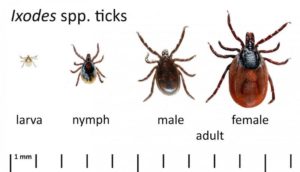#AskTheVet with Dr. Rachel Gardner
Question: How do I know if my horse has Equine Lyme Disease? What do I do if my horse does have it?
Answer:
Lyme disease is caused by infection with Borrelia burgdorferi, which is transmitted to the horse through the bite of an infected Ixodes spp. tick. Horses are commonly infected with B. burgdorferi following a tick bite, however many of these horses will never develop Lyme disease. Syndromes that are documented to be caused by B. burgdorferi infection are neuroborreliosis (infection of the nervous system), cutaneous pseudolymphoma (infection of the skin at the site of the tick bite) and uveitis (ocular inflammation). Lameness, stiffness and lethargy are frequently blamed on Lyme disease, though while possible, there is little evidence to show that Lyme disease actually results in these signs.

If you are concerned that your horse could have Lyme disease, a complete veterinary exam should be performed. If your horse is showing signs of lameness, stiffness or lethargy, it is especially important to rule out other possible diagnoses by pursuing a physical exam, lameness exam and/or bloodwork as recommended by your veterinarian.
If a complete veterinary exam yields suspicion of Lyme disease, blood tests can be performed to assess antibody production to B. burgdorferi. Interpretation of these tests can be challenging, however, because a positive result indicates exposure but does not necessarily confirm infection. Even horses with very high levels of antibodies to B. burgdorferi may never experience clinical signs of Lyme disease. It is for this reason that routine testing of healthy horses is not recommended, and treatment based solely on the degree of antibody production is not recommended.
Depending upon the clinical signs your horse is showing, other diagnostic tests can also be used to help diagnose Lyme disease. These tests may include sampling and testing of cerebrospinal fluid or biopsies and testing of skin, synovial membranes or other tissues.
The mainstay of treatment for Lyme disease is antibiotic therapy, however the antibiotic chosen may depend upon the clinical signs the horse is showing and the preference of your veterinarian. Common treatment options include minocycline, oxytetracycline or doxycycline. Duration of treatment is variable and should be based on response to treatment rather than re-evaluation of serum antibody titers.
Recent Posts
About Us
At B.W. Furlong & Associates, we are progressive leaders delivering the ultimate in veterinary care to our equine patients and clients in both the hospital and ambulatory setting. We have several associated practices offering exemplary care and services in New Jersey, Florida, and Virginia
